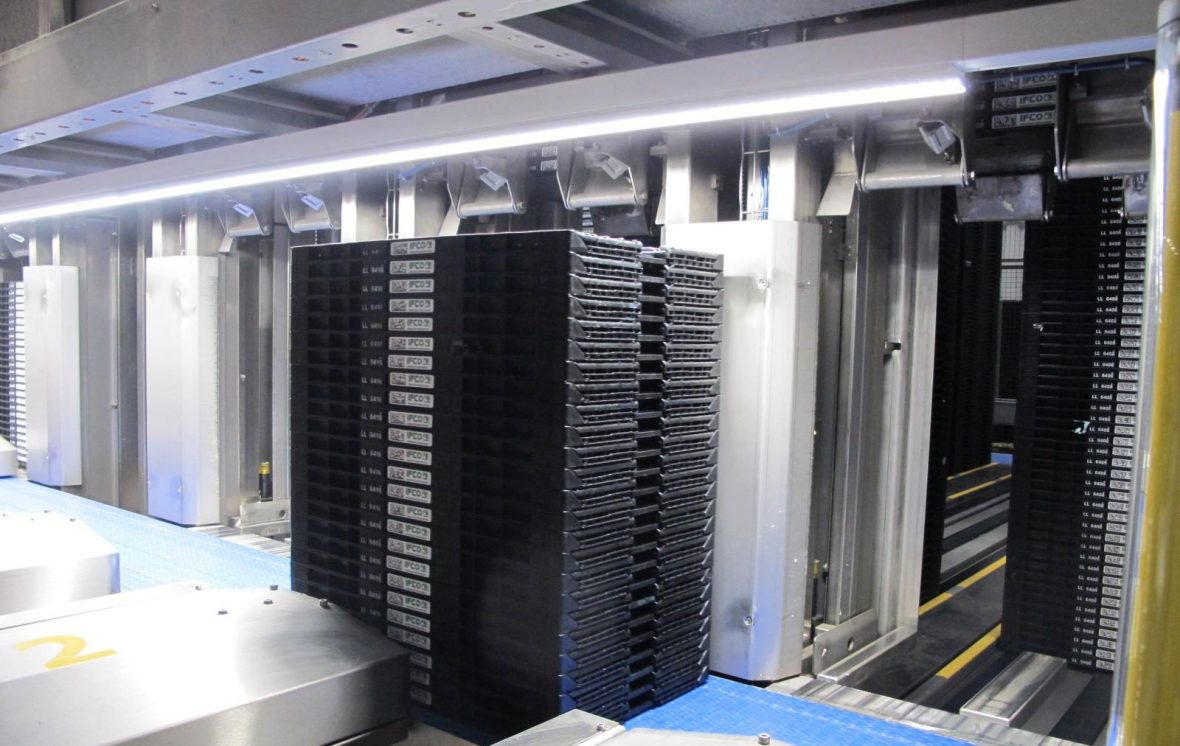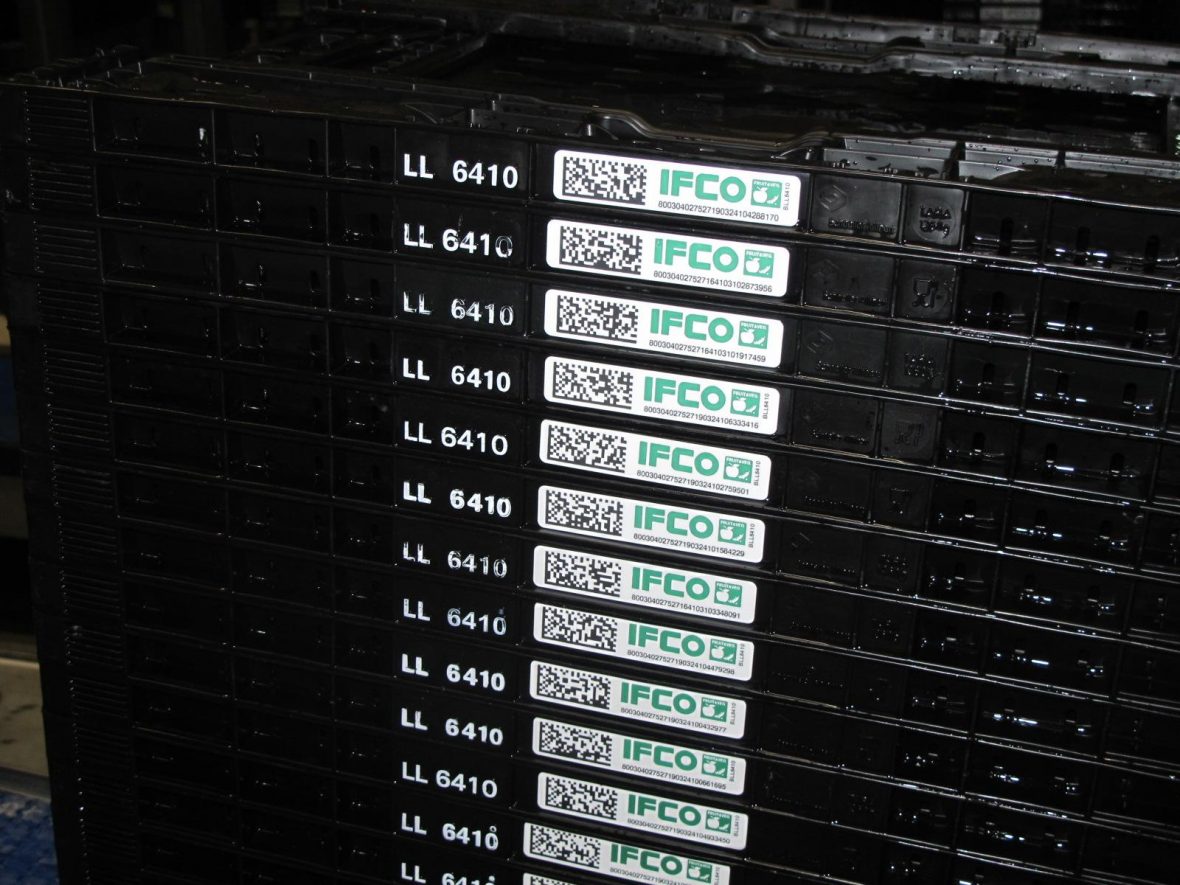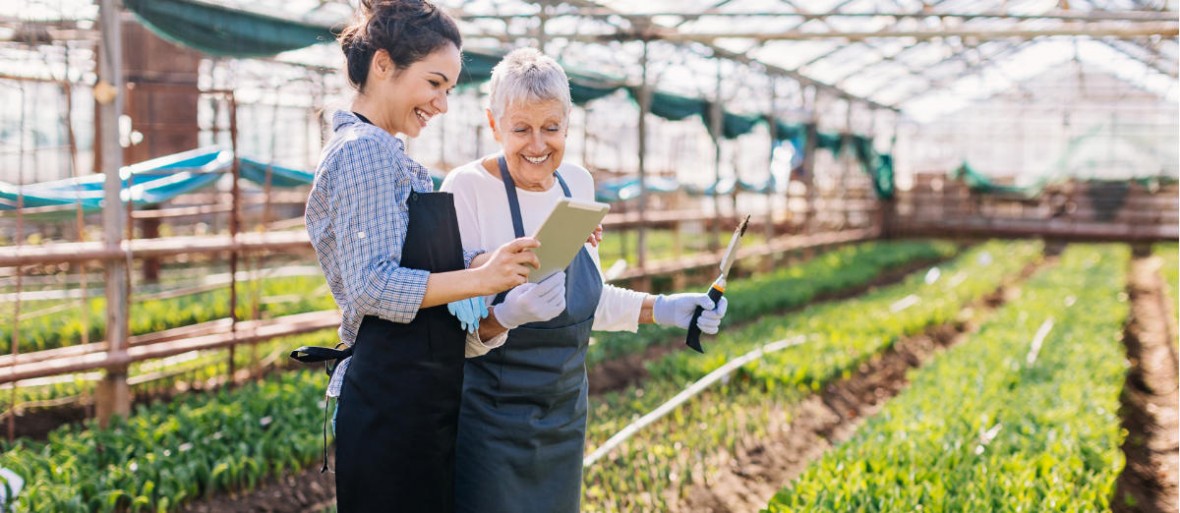Within the food industry, the priority is safety – for food, its suppliers, employees and consumers. IFCO meets this challenge by upholding the highest food safety standards. Our solution is based on our SmartGuardian™ system, which continually monitors washing processes and provides our customers with verifiable data.
By providing food safety through proper sanitation, IFCO maintains food quality during the entire logistics chain. IFCO’s SmartGuardian™ is an excellent example of digitalization used in supply chain management. The integrated software and hardware system continuously monitors the IFCO reusable packaging containers (RPCs) in our washing facilities, making certain that pathogens, traces of dirt and harmful substances are removed. Because SmartGuardian™ also meticulously documents all cleaning and disinfecting steps, our customers can trust that food transported in IFCO RPCs avoids contamination from packaging. In this way, SmartGuardian™ protects all of your customers, too.
In the food industry, hygiene is essential. With our technology-based SmartGuardian™ system, IFCO makes sure that all processes across the automated system uphold stringent international sanitation requirements. The SmartGuardian™ system also guarantees that our cleaning and disinfecting parameters are identical in the IFCO washing facilities around the world, including in wash depots run by third-party operators.
A look inside one of IFCO’s most advanced washing facilities in Krefeld, Germany, opened in 2017, reveals state-of-the art automation in action as it sorts, unfolds, washes, rinses, sanitizes, folds, dries, stacks and palletizes some 75 million IFCO RPCs per year. Here, as in all US and European washing facilities, SmartGuardian™ chaperones the automated cleaning processes to uphold the highest food safety standards. This provides customers with a transparent and efficient process, and provides a pallet-level audit trail.
With SmartGuardian™, all machine sensors are connected to a central server. The sensors transmit data and the server maintains a record of the system’s operation. As the most advanced wash-monitoring technology in the industry, SmartGuardian™ measures and monitors key parameters including water flow and temperature, pump pressure, contact time, detergent and disinfectant concentration. Each of these parameters is set up to accommodate the type of IFCO RPC going through the system, explains Thomas Albrecht, Vice President Service Center Operations at IFCO.
For example, black or green IFCO RPCs that carry fruit and vegetables might contain residues from pest control substances. However, red IFCO RPCs for meat require completely different temperatures, detergents and disinfectants to control a range of potential pathogens found in highly perishable protein-rich products. In Krefeld, the halls have been designed and built specifically for housing IFCO cleaning processes. The receiving docks are also physically separated from the washing and dispatch areas. This is another safety measure that serves to avoid any possible contamination, because dirty and clean IFCO RPCs never come into contact.
To ensure that IFCO RPCs maintain the highest standard of food safety, automation is key. It ensures that all processes can be controlled and fully monitored. Following individual inspection of each IFCO RPC that arrives, cleaning and sanitizing is managed in accordance with international Hazard Analysis and Critical Control Point (HACCP) guidelines, which require continuous monitoring and data validation every hour. If the parameters are not within the defined ranges, SmartGuardian™ automatically sends alerts or stops the machine.
"When parameters get out of range, determining the cause might require detective skills by the shift manager," explains Albrecht. Possible causes include water pressure or temperature drop, or clogged filters, he adds. But customers do not need to play detective: At the end of each shift, the software produces a report on each shift’s parameters, activities or any warnings or stoppages. "SmartGuardian™ not only monitors each step, but it helps us to optimize processes," Albrecht says.

But automation works best combined with a ‘human touch’. So when it comes to quality assurance, particularly for controlling pathogens, auditors play the leading role. IFCO specialists or third-party auditors hold daily, weekly and monthly inspections. "At every shift, each machine undergoes microbiological testing," says IFCO Manager Operational Excellence Josef Hanebrink. Inspectors also swab several points on IFCO RPC surfaces; some samples are evaluated immediately, while others are sent to the lab for 24-hour analysis. The inspectors also audit employee adherence and the system’s documentation, particularly the SmartGuardian™ shift report. This report also gives details, for example, of the type of contaminants detected in IFCO RPCS arriving at the washing facility. In this way, automated processes optimize the audit process as well, preparing critical data and updates at every step. Driving sustainability
Not only is the overall process more secure, but it’s more efficient – saving valuable resources like water and power at every step. IFCO cares about the environment – and our business model and processes reflect this philosophy – for example, through the use of eco-friendly, certified DiverseyTM detergents and disinfectants, and innovative water management. During the wash cycle, the freshest water comes in at the rinse stage and is filtered and reused as it travels in reverse direction through the cycle up to the prewash, as a way to conserve water. At IFCO’s service center in Bordeaux, France, for example, technology is in place to regenerate the used wastewater. The resulting water is so clean that it can even be disposed into the river. Where possible, renewable energy from block-unit power stations generate electricity and heat.
In each wash cycle, automated arms open IFCO RPCs for the pre-wash, and conveyors carry them through fully enclosed modules. Inside each module, dozens of high-pressure nozzles spray the IFCO RPCs. Further on, the clean RPCs tumble through chutes, land upside down, get resprayed in the next module, then righted again, to make sure they are repeatedly washed from all sides.
Once sanitized, the IFCO RPCs are then stacked to be dried via centrifugal drier, which is much more efficient than formerly used air blowers and results in much better drying and hygiene with significantly lower consumption and energy costs. Centrifuge costs less than air blowers and results in better hygiene and minimal residual heat. The dry stacks of IFCO RPCs move to sorting and palletizing. Each bound pallet is identified by labels that contain the information generated by SmartGuardian™. Only IFCO monitors and saves these washing and sanitation parameters for each pallet, to give customers a detailed audit trail for food safety. In fact, IFCO is the only RPC pooler that can provide this service. Now the hygienically clean IFCO RPCs are ready for the next customer order.
But it’s not just food safety and environmental protection we prioritize: Employee safety is also an utmost priority. Designed according to the Zero Harm principle, which aims for no accidents on site, IFCO’s working conditions are ISO-9001 certified.

Under these workplace safety conditions, employees and automation technology – supported by IFCO’s ever-watchful SmartGuardian™ — work together at the washing facilities to ensure food safety, sustainability and supply chain efficiency. As IFCO CEO Wolfgang Orgeldinger explains, "IFCO RPCs that leave a washing facility in Germany today perhaps are delivered to a grower in Italy tomorrow. Once they are used and cleaned there, they might go to Spain to be filled with oranges. Washed and sanitized in Spain, they come back over France, again packed with fruit and vegetables, for German customers. With our SmartGuardian™ system, we make sure that the quality parameters are identical for every IFCO RPC, no matter where it is cleaned."
Ensuring food safety, driving sustainability and using automation to provide identical quality standards in our washing facilities: For IFCO, this is our daily service for our customers and consumers – and SmartGuardian™ makes it possible!
Stay up to date
Want the latest fresh food packaging industry knowledge delivered straight to your inbox? Subscribe to our newsletter and get the latest news, trends, articles and more!
